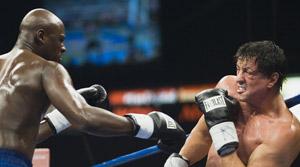
Rocky Balboa (Sylvester Stallone, 2006)
It's easy to dismiss Rocky Balboa, Sylvester Stallone's send-off to one of his most beloved cinematic alteregoes, Rocky Balboa. After all, Rocky (1976) has been regarded as an overly praised film; its Oscar trophy a mere indication of the time's irrational love for the underdog rather than artistic approval. It's sequels, all four of them, are all commercial ventures that seek to capitalize on the character. It can't be denied however that the Philly-bred Italian boxer has garnered a status of an icon; its famous tune "Gonna Fly" has acquired a timeless feel and rhythm familiar even to those born after the phenomenon. After that initial bewildered raised eyebrow and ponderous smirk when Stallone announced his desire to resurrect the franchise, I thought Rocky does deserve a chance at a glorious bow before he finally retires.
So it has been a decade and some years since we last saw Rocky Balboa. We first see Rocky with waking up; he visits the grave of his wife and tries to invite his son, now a corporate slave, to spend dinner in his restaurant (named after his deceased wife). Aside from the obvious physical changes (Stallone looks much much older, much much bulkier, and he talks with a much much more obvious laziness), a not-so-subtle emotional weight bothers the retired boxer. It also feels like the rest of his part of Philadelphia is sharing in his reminiscing woes. Paulie (Burt Young) becomes Rocky's receptacle of his passionate speeches; Li'l Marie (Geraldine Hughes), now grown-up, sad, and mother to half-Jamaican Steps (James Kelly III); Rocky opponent Spider Rico (Pedro Lovell) feels like a loafer in his old age. Rocky has turned into a living fossil; his restaurant an avenue for his celebration of his glory days. Cinematographer J. Clark Mathis bathes Philadelphia with a somber hue; he seemingly frames Rocky's interactions with the purpose of showing a man slowly drifting away and trying his best to come back.
Most of the film is spent detailing Rocky's geriatric dilemmas. Fantastically, most of the stuff is actually quite effective --- a sort of slow and gradual build-up to the ultimate underdog match. Written by Stallone, the screenplay is a bit of a struggle to sit through. When you are tortured into listening to Stallone delivering wordy chicken-soup-for-the-soul speeches with his lazy oratorical mannerisms, it should somehow pose as a problem for the film. But interestingly, Stallone's sentimental build up has got me hooked that the overwrought speeches, the corny one-liners, the quote-of-the-day-worthy phrases are taken in as mere parts of this nostalgia trip rather than points for criticism.
Every boxing pic relies on that huge match to deliver its goods. Rocky Balboa however suffers from it. Mason Dixon (Antonio Tarver), Rocky's opponent, is an iffy character. When the antagonist should be manipulating our emotions (Appolo Creed (Carl Weathers) and Ivan Drago (Dolph Lundgren) of Rocky and Rocky IV (1985) respectively were quite successful with that) so that we can root further for the battled underdog, Mason Dixon provides for a mere diversion, another emotionally-embattled character the film has too much off; and that doesn't simply help the film which banks entirely on the huge match. It also doesn't help that the match is filmed terribly; a little bit too much flashback, too much bad editing, too much flash and tricks. All the techniques mustered by Stallone to pump up the final match of Rocky Balboa backfire.
It is by no means a bad film; it is just sometimes good, and sometimes utterly terrible. It is also by no means a failure; its probably the most interesting entry to the franchise. The beginning felt like a solemn deconstruction of a declining hero; Stallone's respect for the icon he has made carried the film until the end. Rocky Balboa is more sad than triumphant end to the series.
0 comments:
Post a Comment